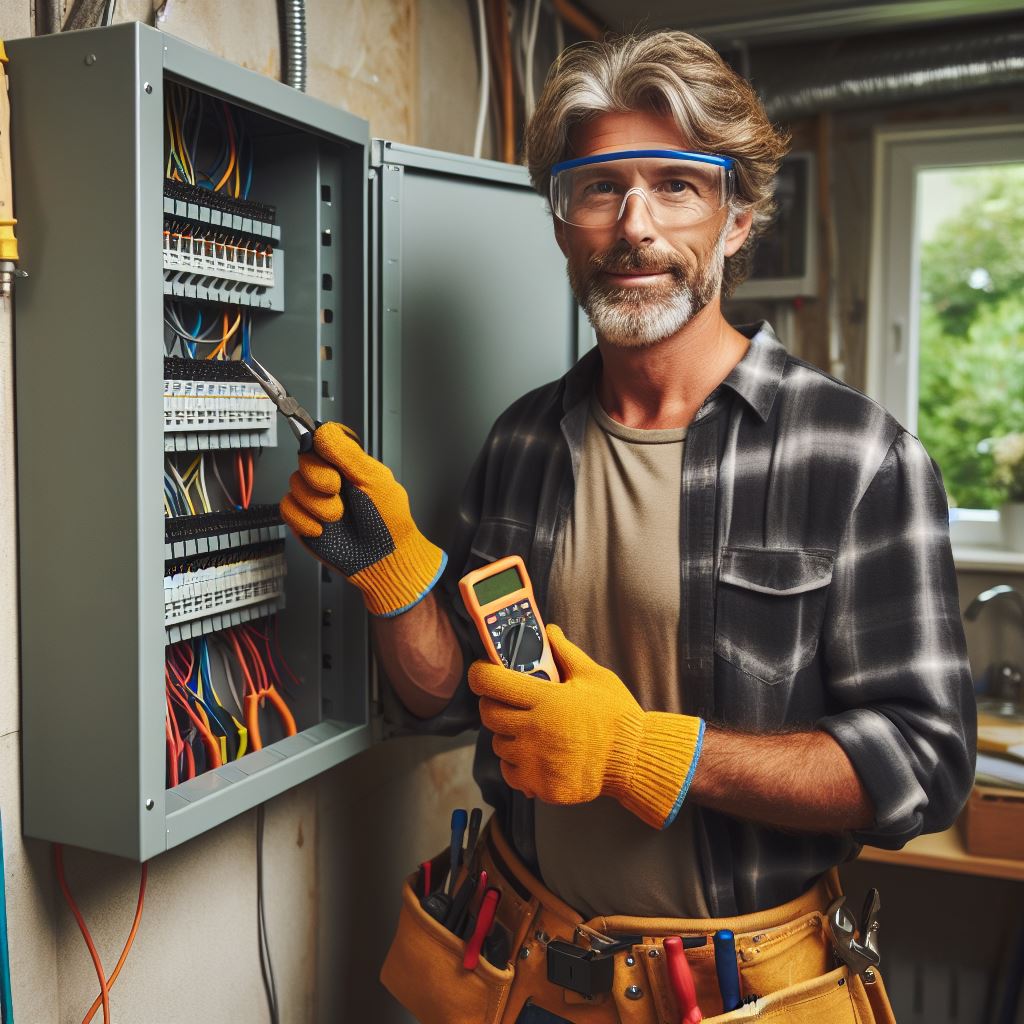Electrical Safety: Maintenance Must-Dos
Last Updated on January 30, 2024
Introduction
Electrical safety plays a crucial role in ensuring the safety of homes and preventing potential hazards.
Understanding common electrical hazards is essential to avoiding accidents.
This blog post aims to provide an overview of these hazards and emphasize the importance of electrical safety.
Importance of Electrical Safety in Homes
Electrical safety is vital to protect both property and human lives from potential dangers.
Faulty electrical systems can cause fires, electric shocks, and even fatalities. Implementing proper safety measures is crucial to safeguarding homes.
Overview of Common Electrical Hazards
- Faulty Wiring: Outdated or damaged wiring can cause short circuits and electrical fires.
- Overloaded Circuits: Plugging multiple devices into a single outlet can overload the circuit and lead to overheating.
- Electrical Appliances: Faulty appliances can electrocute individuals or cause fires if not properly maintained.
- Extension Cords: Using damaged or improperly used extension cords can pose fire and shock risks.
- Water and Electricity: Mixing water and electricity can result in electric shocks or even electrocution.
Purpose of the Blog Post
The primary purpose of this blog post is to raise awareness about the significance of electrical safety.
By highlighting common electrical hazards, readers can identify potential risks and take preventive measures.
Implementing safety guidelines and regular electrical maintenance is essential to protecting homes and ensuring the well-being of occupants.
In essence, understanding electrical safety is crucial for maintaining a secure home environment.
By familiarizing themselves with common electrical hazards, individuals can take the necessary precautions to prevent accidents and protect their loved ones.
Regular maintenance and adherence to safety guidelines are imperative for a safe and secure electrical system in any home.
Regular Maintenance Tasks for Electrical Safety
A safe and functioning electrical system is crucial for the well-being and efficiency of any household or business.
Regular maintenance tasks help ensure electrical safety, prevent accidents, and extend the lifespan of electrical components.
Here are some essential maintenance must-dos:
Inspecting and replacing damaged or outdated electrical cords and wires
In your maintenance routine, pay close attention to electrical cords and wires.
These components are crucial for delivering power to appliances and devices throughout your home or workspace.
Over time, cords can become worn, frayed, or damaged due to frequent use, bending, or exposure to environmental factors.
To ensure electrical safety, regularly inspect all cords for any signs of wear, including cuts, abrasions, or exposed wires.
Even minor damage can pose a significant risk of electrical shock or fire hazard. If you notice any damage, it’s essential to replace the cord immediately.
Do not attempt to repair damaged cords with tape or makeshift solutions, as this can be dangerous and ineffective.
When replacing cords, be sure to use cords that are appropriate for the intended use and load requirements of the device.
Using cords that are too thin or inadequate for the task can lead to overheating and electrical failure.
Ensuring proper grounding for electrical outlets
Proper grounding is essential for electrical safety, as it provides a path for excess electrical current to safely dissipate into the ground.
Without proper grounding, electrical appliances and devices can become energized, increasing the risk of electric shock or fire.
To ensure proper grounding, use a ground fault circuit interrupter (GFCI) tester to check outlets periodically.
GFCI testers are readily available at hardware stores and are easy to use. Simply plug the tester into the outlet and press the test button.
The tester will indicate whether the outlet is properly grounded.
If an outlet is not properly grounded, it’s crucial to address the issue promptly.
Contact a qualified electrician to inspect the outlet and make any necessary repairs or upgrades.
Testing and replacing malfunctioning electrical outlets and switches
Electrical outlets and switches are frequently used components of the electrical system, making them susceptible to wear and tear over time.
Malfunctioning outlets and switches can pose serious safety hazards, including electrical shocks, fires, and damage to connected devices.
Regularly test outlets and switches for proper functionality to identify any issues early on.
Simple tests, such as plugging in a lamp or using a circuit tester, can help determine if an outlet or switch is working correctly.
If you encounter any problems, such as flickering lights, sparking, or outlets that feel warm to the touch, it’s essential to address them immediately.
Replace malfunctioning outlets and switches promptly to prevent further complications and ensure continued electrical safety.
When replacing outlets or switches, always follow safety guidelines and consult a professional electrician if you’re unsure of the process.
Checking and replacing damaged or outdated light fixtures
Light fixtures play a vital role in providing illumination and enhancing the ambiance of a space.
However, like other electrical components, light fixtures can deteriorate over time due to factors such as age, usage, and environmental conditions.
As part of your regular maintenance routine, inspect light fixtures throughout your home or workspace for any signs of damage or wear.
This includes checking for cracks, loose connections, or corrosion that may compromise the fixture’s integrity.
Additionally, consider the age and technology of your light fixtures.
Older fixtures may be less energy-efficient and more prone to failure than newer, more advanced models.
If you have outdated fixtures, consider replacing them with newer, more energy-efficient options to improve safety and performance.
When replacing light fixtures, be sure to follow proper installation procedures and safety precautions.
If you’re not comfortable or experienced with electrical work, consider hiring a qualified electrician to assist with the installation.
Cleaning and maintaining electrical appliances
Electrical appliances play a significant role in our daily lives, from cooking and cleaning to entertainment and communication.
To ensure the safety and longevity of your appliances, regular cleaning and maintenance are essential.
Dust, dirt, and debris can accumulate on the surfaces and components of electrical appliances over time, potentially impacting performance and safety.
Regularly clean appliances both inside and out to remove any buildup and ensure proper airflow and ventilation.
When cleaning appliances, pay special attention to cords, plugs, and electrical connections.
Inspect cords for any signs of damage or wear, such as fraying or exposed wires, and replace them as needed.
Clean plugs and electrical connections with a dry cloth to remove any dirt or corrosion that may interfere with conductivity.
In addition to cleaning, be sure to follow manufacturer guidelines for maintenance and service intervals.
Some appliances may require periodic inspections or tune-ups to ensure optimal performance and safety.
By incorporating these regular maintenance tasks into your electrical safety routine, you can help protect yourself, your family, and your property from electrical hazards and ensure a safe and reliable electrical system.
Read: Lead Paint Regulations: Ensuring Safety in Older Homes
Conducting Electrical Inspections
Hiring a licensed electrician for a thorough inspection
When it comes to electrical safety, conducting regular inspections is crucial.
One of the best ways to ensure a comprehensive evaluation is by hiring a licensed electrician.
Electricians are trained professionals who possess the expertise to identify potential hazards and detect underlying issues that may not be visible to the untrained eye.
They have the knowledge to assess the overall condition of your electrical system.
A licensed electrician will thoroughly examine all aspects of your electrical setup, including the wiring, outlets, switches, and panels.
They will be able to determine if there are any faulty components or potential risks that need immediate attention.
By having a professional inspection, you can gain peace of mind, knowing that your electrical system is safe and in compliance with local electrical codes and regulations.
Checking the electrical panel for any issues
The electrical panel is the heart of your electrical system, housing the circuit breakers or fuses that protect your home from electrical overloads.
It is essential to regularly inspect this critical component of your electrical setup.
During an inspection, the electrician will carefully examine the panel for any signs of damage, such as loose connections, burnt marks, or overheating.
These issues can indicate potential fire hazards or electrical failures.
The electrician will also verify that the panel is properly labeled.
Clear and accurate labeling ensures that you can quickly identify and shut off the power to specific areas or circuits in case of an emergency or maintenance requirement.
If any issues are detected, the electrician will recommend necessary repairs or replacements to ensure the electrical panel functions reliably and safely.
Evaluating the condition of wiring and cables in the house
The condition of the wiring and cables in your house is another critical aspect of electrical safety that should be inspected regularly.
Over time, wiring can deteriorate due to factors such as aging, rodents, or physical damage.
Faulty wiring can cause electrical shocks, short circuits, or even fires. Therefore, it is important to assess the condition of the wiring regularly.
A licensed electrician will inspect the visible wiring and cables in your home.
They will check for any signs of wear and tear, such as frayed insulation or exposed wires.
They will also assess the type of wiring used and whether it meets current safety standards.
If outdated or hazardous wiring is identified, the electrician will recommend necessary repairs or upgrades to ensure the safety and efficiency of your electrical system.
Examining the condition and functionality of electrical outlets and switches
Electrical outlets and switches are used daily in our homes, but we often overlook their maintenance.
However, faulty outlets and switches can pose serious safety risks.
During an electrical inspection, the electrician will examine each outlet and switch for any signs of damage or malfunction.
This includes checking for loose connections, crackling sounds, or overheating.
Additionally, the electrician will ensure that the outlets and switches are properly grounded.
Proper grounding is essential to protect against electrical shocks and to prevent damage to sensitive electronic devices.
If any issues are found, the electrician will recommend repairs or replacements to ensure that your outlets and switches are safe and in optimal working condition.
Inspecting outdoor electrical components
Outdoor electrical components, such as lighting fixtures, outlets, and electrical panels, are exposed to various weather conditions and environmental factors.
During an inspection, the electrician will assess the condition of these outdoor components to ensure they are properly sealed, protected, and functioning correctly.
They will check for any signs of water damage, corrosion, or loose connections.
Faulty outdoor components can not only compromise electrical safety but can also lead to equipment failure or electrical outages.
The electrician will recommend necessary repairs or replacements to address any issues and ensure that your outdoor electrical components are safe and reliable.
Regular electrical inspections are essential for maintaining a safe and reliable electrical system in your home.
By hiring a licensed electrician to conduct thorough inspections, you can identify potential hazards, detect underlying issues, and ensure compliance with electrical codes.
From checking the electrical panel and wiring to evaluating the condition of outlets, switches, and outdoor components, a comprehensive inspection covers all critical areas of your electrical setup.
By prioritizing electrical inspections, you are investing in the safety of your home and the well-being of your family.
Don’t wait for issues to escalate – schedule regular inspections and address any identified concerns promptly.
Remember, electrical safety is not something to be taken lightly.
Putting preventive measures in place through regular maintenance will help you avoid unnecessary risks and potentially costly repairs in the future.
Read: Common Repairs in Rentals: A Landlord’s Guide

Safety Measures for Electrical Appliances
Proper installation and positioning of electrical appliances
When installing electrical appliances, ensure they are securely mounted or placed on stable surfaces.
Attach appliances to the wall or floor with brackets or screws to prevent tipping or falling.
Keep appliances away from water sources and avoid placing them in high-traffic areas to reduce the risk of accidents.
Regularly cleaning and maintaining electrical appliances
Regularly clean electrical appliances to prevent dust and debris buildup.
Use a damp cloth or sponge and mild detergent to wipe down the surface of the appliances.
Inspect appliances for any loose parts or signs of damage, and repair or replace them promptly.
Proper storage and use of extension cords and power strips
Ensure extension cords and power strips are in good condition before using them.
Avoid running cords across walkways or under carpets, as this can cause tripping hazards and damage the cords.
Do not overload extension cords or power strips with too many appliances or devices.
Unplugging appliances when not in use
Unplug appliances when they are not in use to minimize the risk of electrical fires or accidents.
Make it a habit to turn off appliances before unplugging them to avoid electrical shocks.
Invest in smart plugs or power strips with automatic shut-off features for added convenience and safety.
Ensuring appliances have proper ventilation
Allow proper airflow around appliances to prevent overheating and potential fire hazards.
Avoid covering or blocking air vents on appliances, as this can impede their cooling mechanisms.
Ensure appliances have adequate space and are not cramped together to maintain proper ventilation.
By following these safety measures for electrical appliances, you can minimize the risk of accidents and ensure the longevity of your devices.
Proper installation, regular cleaning, and maintenance are essential for their optimal performance and safety.
Remember to store and use extension cords and power strips correctly to prevent overloading and tripping hazards.
Unplugging appliances when not in use helps conserve energy and eliminates the risk of electrical fires.
Lastly, maintaining proper ventilation around appliances reduces the chance of overheating, which can cause malfunctions or even fires.
Keep these safety tips in mind to protect yourself, your family, and your electrical appliances.
Read: Property Insurance Regulations: Staying Informed
The Importance of Ground Fault Circuit Interrupters (GFCIs) and Arc Fault Circuit Interrupters (AFCIs)
How GFCIs and AFCIs work
- GFCIs continuously monitor the flow of electricity and sense imbalances
- When an imbalance is detected, GFCIs quickly interrupt the electrical circuit to prevent electric shock
- AFCIs detect abnormal arcing conditions and quickly disable the circuit to prevent electrical fires
Importance of installing GFCIs and AFCIs in the home
GFCIs and AFCIs provide vital protection against electrical hazards, enhancing the overall safety of your home.
- GFCIs protect against electric shock, preventing potentially fatal injuries
- AFCIs protect against electrical fires, reducing the risk of property damage and injuries
- Installing GFCIs and AFCIs reduces the likelihood of electric shock and fire-related accidents
Locations where GFCIs and AFCIs are required
Building codes and safety standards dictate specific locations where GFCIs and AFCIs must be installed:
- GFCIs are required in areas where water and electricity are present, such as kitchens, bathrooms, and laundry rooms
- AFCIs are required in bedrooms and living rooms to prevent electrical fires caused by potential arcing
- Outdoor outlets and garages also require GFCIs and AFCIs to ensure safety in those areas
In general, the installation of GFCIs and AFCIs is crucial to maintaining electrical safety in the home.
These devices provide essential protection against electric shock and electrical fires.
Make sure to comply with building codes and safety standards by installing GFCIs and AFCIs in the required locations.
Read: Smart Upgrades for Easier Property Maintenance
Electrical Safety Tips for DIY Projects
Achieving electrical safety is crucial when working on DIY electrical projects. Here are some important tips to follow:
Importance of turning off the power before starting any electrical work
- Always switch off the power at the circuit breaker before beginning any electrical project.
- This precaution helps prevent electric shocks and potential accidents.
- Double-check that the power is truly off by using a voltage tester.
- Working on live circuits can be fatal, so never skip this crucial step.
Using proper tools and equipment for electrical tasks
- Invest in high-quality electrical tools and equipment for safe and efficient work.
- Using inadequate or damaged tools can lead to accidents and unreliable results.
- Always use insulated tools when working on live circuits.
- Protective equipment like gloves, goggles, and helmets should also be worn for added safety.
Ensuring proper wiring techniques and connections
- Learn and follow the recommended wiring techniques for different electrical installations.
- Securely tighten all wire connections to prevent loose connections or potential fire hazards.
- Use wire connectors and electrical tape to protect exposed wires.
- Avoid overloading circuits by distributing electrical loads evenly.
Seeking professional help for complex electrical projects
- If a project involves complex electrical tasks or unfamiliar systems, consult a licensed electrician.
- Professional expertise can ensure the work is done correctly and to code.
- Complex projects may include electrical panel upgrades, rewiring, or installing new outlets.
- Don’t risk causing damage or compromising safety when dealing with intricate electrical work.
Proper disposal of electrical waste
- When disposing of old or unused electrical components, comply with local regulations.
- Improper disposal can harm the environment and pose risks to sanitation workers.
- Recycling services or designated facilities can guide you on how to properly dispose of electronic waste.
- Remember, responsible disposal is essential for a sustainable and safe environment.
Following these electrical safety tips for DIY projects will help protect yourself and others while achieving successful results.
Safety should always be the top priority when working with electricity.
Conclusion
Regularly inspect outlets, switches, and cords for damage. Replace worn-out components promptly.
Test ground fault circuit interrupters (GFCIs) monthly. Update old wiring to prevent fire hazards. Keep electrical panels accessible and free from clutter.
Take charge of your home’s electrical safety. Educate yourself and your family about potential hazards.
Don’t overload circuits or use damaged appliances. Invest in surge protectors for added security. Stay vigilant and address issues promptly.
Schedule annual inspections by qualified electricians. Ensure your home meets current electrical standards.
Don’t overlook the importance of routine maintenance. Professional inspections can uncover hidden dangers. Prioritize safety for peace of mind.
Electrical safety is non-negotiable. By staying proactive and informed, you can prevent accidents and protect your loved ones.
Make these maintenance tasks a priority and empower yourself to create a safer home environment. Don’t hesitate to seek professional help when needed.
Your diligence today ensures a brighter and safer future tomorrow.


